|
|
|
Sort Order |
|
|
|
Items / Page
|
|
|
|
|
|
|
| Srl | Item |
| 1 |
ID:
146779
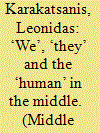

|
|
|
|
|
| Summary/Abstract |
This paper explores the way in which historiography produced in Turkey (or by Turkish scholars abroad) approaches foreign military/diplomatic interventions in the Ottoman Empire during the long nineteenth century. It focuses on three case studies where ‘humanitarian reasons’ formed the discursive basis/justification of such interventions. The author argues that when the distinction between victims and perpetrators, civilians and combatants, emerges as an interpretive dilemma in the debates of the historical period examined, similar interpretive and normative challenges are inherited by the historiographical accounts of it. The paper distinguishes two contrasting ways in which Turkish historiographical scholarship responds to such a dilemma. The first remains confined by the way Ottomans themselves viewed the world around them and uncritically reproduces rigid categories of selfhood and otherhood between ‘us’ and ‘them’. The second trajectory offers tools for understanding the conflicts behind the construction of the category of the human worth of international protection, and disentangles itself from the normative bind described above.
|
|
|
|
|
|
|
|
|
|
|
|
|
|
|
|
| 2 |
ID:
146785
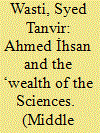

|
|
|
|
|
| Summary/Abstract |
In the past, weekly journals often served as the primary vehicle for the publication and dissemination of high-quality literature. Novels and plays were often serialized in such periodicals, which also featured items of poetry, essays and even political analysis. The Turkish weekly Servet-i Fünun [Wealth of the Sciences] which began publishing in 1891 and closed down in 1944 attracted contributions from the best Turkish writers of its time, and its very name became a banner for new currents in Turkish literature, whether poetry or prose. Part of its success was due to the single-minded labours of its founder and editor, Ahmed İhsan, a journalist and novelist of distinction. The article attempts to assign to the journal and its editor their proper place within the history of Turkish literary journalism.
|
|
|
|
|
|
|
|
|
|
|
|
|
|
|
|
| 3 |
ID:
146778
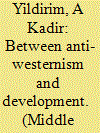

|
|
|
|
|
| Summary/Abstract |
As Turkey's Gezi Park protests reminded us, Islamist parties the world over demonstrate utter disregard of the environment in their discourse and actions. However, Islam as a religion places strong emphasis on environmental protection. Thus, as the representatives of Islam that these parties claim themselves to be, it is puzzling that environmental policy is all but absent from most Islamist platforms. I ask, what explains the poverty of Islamists in regards to the environment? I argue that the reason for this poverty is found within and conforms to political Islam's problematic relationship with modernity, particularly in regards to their strong anti-western sentiment and self-purported victim status. My findings suggest that the inattention Islamists give to the environment is due to their association of environmentalism with the West and because of the uniquely unfavourable socio-economic environments in which they exist, which sends environmentalism to the purview of ‘low politics’. This analysis points to an inherent weakness in Islamist ideology – their lack of pragmatic policy. Hence, the peculiar case of Islamists and the environment is but a symptom of a larger issue within Islamism and can be a key element to understanding why and how Islamism is likely to fail.
|
|
|
|
|
|
|
|
|
|
|
|
|
|
|
|
| 4 |
ID:
146775


|
|
|
|
|
| Summary/Abstract |
This article analyses the British role in establishing and maintaining a Jewish–Arab demarcation line by means of a policy of Jewish unity and by enabling Ashkenazi Zionist control of the Yishuv. In the first part, it analyses British policy towards the local Sephardi as well as the local Ashkenazi anti-Zionist Orthodox communities, both of which for different reasons did not neatly fit into the Jewish/Zionist–Arab binary. I argue that the British followed a policy of Jewish unity at the inception of the Mandate which they upheld repeatedly against Ashkenazi anti-Zionist Orthodox efforts and which by 1936 had created a truism enforcing a binary understanding of the conflict. In the second part, this article analyses the ways in which these communities presented themselves vis-à-vis the British. I argue that despite different strategies of maximizing their influence, both communities foundered on the existing power configurations.
|
|
|
|
|
|
|
|
|
|
|
|
|
|
|
|
| 5 |
ID:
146783
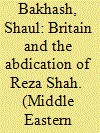

|
|
|
|
|
| Summary/Abstract |
On the eve of the Anglo-Soviet invasion of Iran in the Second World War, Sir Reader Bullard, the British minister in Tehran, urged on his government the desirability of removing the Iranian ruler, Reza Shah, from office. Association with the ‘universally detested’ shah, whom he described as a ‘greedy ignorant savage’, was detrimental to Britain's interests and its war effort. In the weeks that followed the Anglo-Soviet occupation of Iran, Bullard continued to press for and to shape the ultimate British decision to force Reza Shah to abdicate and go into exile. Yet, this was not always Bullard's view of Britain's relationship with the Iranian ruler. When he presented his credentials 20 months earlier, Bullard described it as his ‘urgent duty’ to win Reza Shah's favour. Nor did Bullard's insistence that Britain depose the Shah initially find favour with the Foreign Secretary, Anthony Eden, his Middle East staff at the Foreign Office, or with Churchill. This article traces the evolution of Bullard's own view of Reza Shah and the developments that led the Foreign Office, initially eager to win Reza Shah's favour and even ready to offer Reza Shah a ‘substantial bribe’ for his cooperation, to take steps to topple Reza Shah from the throne.
|
|
|
|
|
|
|
|
|
|
|
|
|
|
|
|
| 6 |
ID:
146777


|
|
|
|
|
| Summary/Abstract |
This article explores women's rights activism in Turkey during the Justice and Development Party's (AKP) time in power (2002–present). A comparative analysis of three feminist campaigns for policy reform shows that in a context in which majority public opinion and the policy preferences of the ruling party militate against feminist policy proposals, a strong political ally (the European Union) was necessary to generate a policy change. The article also argues that the political opportunity structures within which feminists are embedded have been reconfigured over the course of the AKP's three terms in power, leaving the AKP in a stronger position to resist feminists’ demands. This explains the paradox of an internally stronger and more dynamic social movement that, nevertheless, appears to have weakened vis-à-vis the state. Furthermore, because some recent legal reforms do not significantly reflect the AKP's or much of the public's preferences, the movement has been less able to generate implementation of recent policy changes.
|
|
|
|
|
|
|
|
|
|
|
|
|
|
|
|
| 7 |
ID:
146781


|
|
|
|
|
| Summary/Abstract |
Supporters of the Fethullah Gülen community, an informal institution with an influential role in Turkish political life, have formed an international chain of schools and student dormitories, and a communications web that includes newspapers, journals, television and radio channels, as well as other companies and finance institutions. Although the community has no formal structure, its followers have established these formal institutions to integrate it into formal systems like education and the economy. This paper focuses on the community's educational organizations to argue that, since the community has preferred to pursue its goals within Turkey's existing formal framework, rather than by challenging it or breaking its rules, it can be defined as an accommodating informal institution rather than complementary, competing or substitutive.
|
|
|
|
|
|
|
|
|
|
|
|
|
|
|
|
| 8 |
ID:
146782
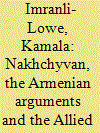

|
|
|
|
|
| Summary/Abstract |
The article explores the territorial conflict between Armenia and Azerbaijan over the Nakhchyvan region after the South Caucasus came under the Allied control following the Mudros Armistice of 30 October 1918. It analyses the arguments of the Armenian Government submitted to the Paris Peace Conference in 1919 to substantiate its vision of territorial delimitation between the two republics with regard to Nakhchyvan, examines the positions of Azerbaijan and Armenia and the Allied Powers on the Nakhchyvan problem and assesses the impact of their stance on the settlement of the issue. It argues that the Armenian claims to the region were land-related, being part of the Armenian nationalist aim of constructing an expanded Armenia from the Mediterranean to Garabagh. It also argues that the Allied Powers were guided by their own interests while making proposals on the settlement of the conflict.
|
|
|
|
|
|
|
|
|
|
|
|
|
|
|
|
| 9 |
ID:
146780


|
|
|
|
|
| Summary/Abstract |
This article explores the techniques and strategies used by Ottoman authorities to control the Bedouin with a specific focus on the province of Hijaz between 1840 and 1908. Using primary sources from the Ottoman and British archives, it argues that the Ottoman Empire developed a ‘politics of negotiation’ towards the tribes in its attempt to secure cities and major pilgrimage and trade routes against tribal attack. The principal agents of the empire who made this negotiated governance possible were the amir of Mecca and the governor of Hijaz. As a result of this policy, imperial authorities had to give significant concessions to the tribes, and they thus incorporated them into the province's imperial order. When the Ottoman economy went through a crisis, as in the 1900s, negotiated governance and order faced great problems.
|
|
|
|
|
|
|
|
|
|
|
|
|
|
|
|
| 10 |
ID:
146776
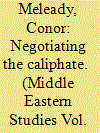

|
|
|
|
|
| Summary/Abstract |
This paper considers two aspects of historiography about the 1967 Arab–Israeli War – American and Soviet foreign policy in the region – to better appreciate the Soviet role in the outbreak of hostilities, as well as how the war concretized the US–Israeli ‘special relationship’ and weakened American–Arab relations. Relying especially on research from the Lyndon Johnson Presidential Library and Foreign Relations of the United States, this paper argues that Soviet officials had little interest in pursuing measures to prevent war during the pre-war crisis because the situation promised to undermine American interests in the region.
|
|
|
|
|
|
|
|
|
|
|
|
|
|
|
|
| 11 |
ID:
146784


|
|
|
|
|
| Summary/Abstract |
This article enquires into the socioeconomic causes of recurrent food scarcity in the nineteenth-century Middle East. Focusing on Iran as a case study, the paper shows that certain categories involved in the production and distribution of grain engaged in profiteering schemes and thereby contributed to the making of food shortage in urban settings. The most important of these groups were the government officials, the landed classes, and the grain merchants. The local bakers were also involved, but they did not have as decisive a role as the other groups. In showing how these categories engaged in market manipulation, the paper contends that food scarcity cannot be explained without a proper understanding of the commercialization of grain and the economic integration of the Middle East in the nineteenth century.
|
|
|
|
|
|
|
|
|
|
|
|
|
|
|
|
|
|
|
|
|